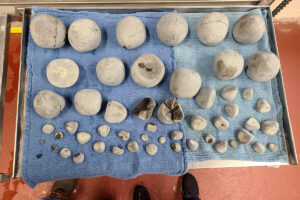Vesicular Stomatitis: South Dakota Announces Horse Import Requirements

Effective immediately, all horses entering South Dakota from states with active VSV quarantines must have a certificate of veterinary inspection (CVI) and an import permit.
Import permits are already and will continue to be required for all other livestock species susceptible to VSV. Accredited veterinarians issuing CVIs can acquire an import permit by calling the South Dakota Animal Industry Board at 605/773-3321.
Vesicular stomatitis virus can cause blisters and sores in the mouth and on the tongue, muzzle, teats, or hooves of horses, cattle, swine, sheep, goats, llamas, and a number of other animals. Lesions usually heal in two or three weeks
Create a free account with TheHorse.com to view this content.
TheHorse.com is home to thousands of free articles about horse health care. In order to access some of our exclusive free content, you must be signed into TheHorse.com.
Start your free account today!
Already have an account?
and continue reading.
Related Articles
Stay on top of the most recent Horse Health news with
















